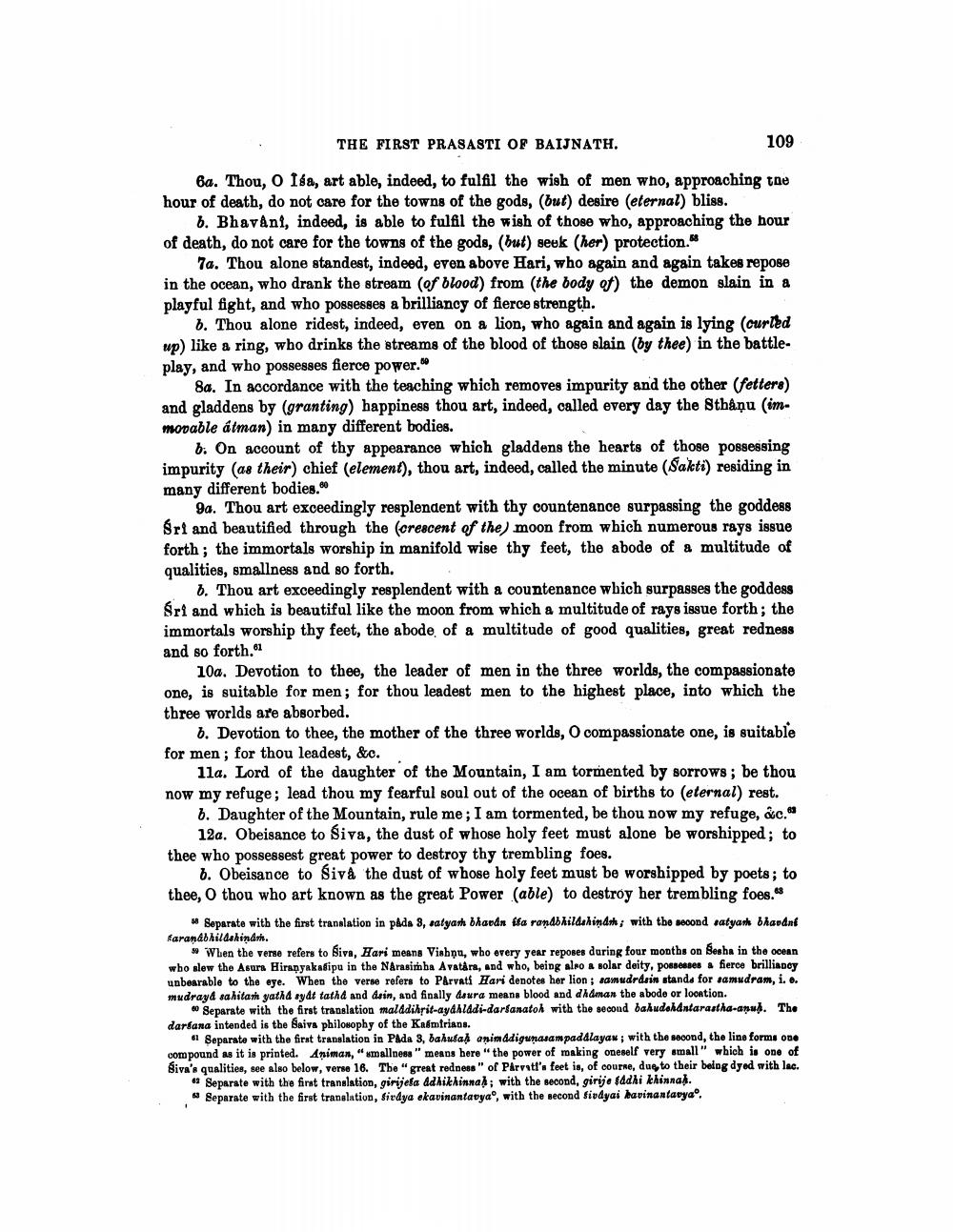________________
THE FIRST PRASASTI OF BAIJNATH.
6a. Thou, O Isa, art able, indeed, to fulfil the wish of men who, approaching the hour of death, do not care for the towns of the gods, (but) desire (eternal) bliss.
b. Bhavani, indeed, is able to fulfil the wish of those who, approaching the hour of death, do not care for the towns of the gods, (but) seek (her) protection."
7a. Thou alone standest, indeed, even above Hari, who again and again takes repose in the ocean, who drank the stream (of blood) from (the body of) the demon slain in a playful fight, and who possesses a brilliancy of fierce strength.
b. Thou alone ridest, indeed, even on a lion, who again and again is lying (curled up) like a ring, who drinks the streams of the blood of those slain (by thee) in the battleplay, and who possesses fierce power."
109
8a. In accordance with the teaching which removes impurity and the other (fetters) and gladdens by (granting) happiness thou art, indeed, called every day the Sthâņu (immovable átman) in many different bodies.
b. On account of thy appearance which gladdens the hearts of those possessing impurity (as their) chief (element), thou art, indeed, called the minute (Sakti) residing in many different bodies."
9a. Thou art exceedingly resplendent with thy countenance surpassing the goddess Sri and beautified through the (crescent of the) moon from which numerous rays issue forth; the immortals worship in manifold wise thy feet, the abode of a multitude of qualities, smallness and so forth.
b. Thou art exceedingly resplendent with a countenance which surpasses the goddess Śri and which is beautiful like the moon from which a multitude of rays issue forth; the immortals worship thy feet, the abode of a multitude of good qualities, great redness and so forth.1
10a. Devotion to thee, the leader of men in the three worlds, the compassionate one, is suitable for men; for thou leadest men to the highest place, into which the three worlds are absorbed.
b. Devotion to thee, the mother of the three worlds, O compassionate one, is suitable for men; for thou leadest, &c.
11a. Lord of the daughter of the Mountain, I am tormented by sorrows; be thou now my refuge; lead thou my fearful soul out of the ocean of births to (eternal) rest.
b. Daughter of the Mountain, rule me; I am tormented, be thou now my refuge, &c." 12a. Obeisance to Siva, the dust of whose holy feet must alone be worshipped; to thee who possessest great power to destroy thy trembling foes.
b. Obeisance to Siva the dust of whose holy feet must be worshipped by poets; to thee, O thou who art known as the great Power (able) to destroy her trembling foes.
58 Separate with the first translation in påda 3, satyam bhavan ita randbhildshindm; with the second satyam bhavání faran&bhilashin&m.
59 When the verse refers to Siva, Hari means Vishnu, who every year reposes during four months on Sesha in the ocean who slew the Asura Hiranyakasipu in the Narasimha Avatars, and who, being also a solar deity, possesses a fierce brilliancy unbearable to the eye. When the verse refers to Pârvati Hari denotes her lion; samudrásin stands for samudram, i. e. mudraya sahitam yatha sydt tatha and dein, and finally deura means blood and dhaman the abode or location.
60 Separate with the first translation maládihrit-ayahladi-darsanatoh with the second bahudehântarastha-anub. The darsana intended is the Saiva philosophy of the Kasmirians.
1 Separate with the first translation in Pada 3, bahutab animadigunasampadalayau; with the second, the line forms one compound as it is printed. Animan, "smallness" means here "the power of making oneself very small" which is one of Siva's qualities, see also below, verse 16. The "great redness" of Parvati's feet is, of course, due to their being dyed with lac.
62 Separate with the first translation, girijesa adhikhinnah; with the second, girije sadhi khinnah. 63 Separate with the first translation, sirdya ekavinantavyao, with the second sivdyai kavinantavya.




